We’ve all seen them – those little silver or gold medallions placed lovingly on corners of books so as not to obstruct their now internationally recognized covers. These distinctions no doubt have a big influence on what many people decide to read next. Before researching the topic, I admittedly understood very little about the award-giving process and the variety of accolades given out by this committee or that. Nor did I let recent award-winners dictate the ebb and flow of my TBR list either. We can all site at least one award-winning novel from our high school curriculum that we loathed with a passion, am I right? And yet, I would not go so far to say, that a flash of gold or silver on a cover doesn’t spark my interest. But where to begin?
When it comes to literary awards, I feel many serious readers pretend to know more than they really do, because admitting otherwise would be biblio-sacrilege. Yes, denial is a common indicator you’ve fallen prey to this guilt-driven syndrome. Allow me to be the first sacrificial lamb for you all by pronouncing, “Yeah, I’ve heard of those literary awards things, but couldn’t tell you much about any one of them. I’m guessing they’re probably important.” Ah! Well I feel better already! I am ready to take my first step on the road to recovery by bringing you all along on a quick crash course!
Welcome to Literary Awards 101
– Major Multi-Genre Award Categories –
Nobel Prize in Literature
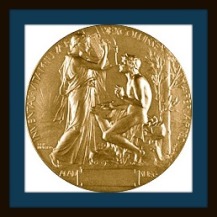
Three Sentence History: The famed Swedish scientist and inventor of dynomite, Alfred Nobel, was a man of many interests and talents, one which was a fervent love of writing and literature. In his will, Alfred Nobel set aside a large portion of his estate to establish the Nobel Prizes and named Literature as the fourth category deserving of an award. From 1901 to the present, the Nobel Prize in Literature has been awarded to both underrated gems, as well as authors that have achieved international acclaim.
Quick Stats
Who Gives it Out: The Swedish Academy, Stockholm Sweden
Established: 1901 (first award for literature given)
Genres Considered: All genres are considered, but the award is typically granted to an author based on their entire body of work as opposed to one specific novel.
Most Recent Winner: Mo Yan (2012)
Some Past Winners: Mario Vargas Llrosa (2010), Dorris Lessig (2007), José Saramago (1998), Toni Morrison (1993), Gabriel García Márquez (1982), Samuel Beckett (1969), Jean-Paul Sartre (1964), John Steinbeck (1962), Ernest Hemingway (1954), William Faulkner (1949), Sinclair Lewis (1930), William Butler Yeats (1923), Rudyard Kipling (1907)
For a full list of award winners click here
Pulitzer Prize in Literature
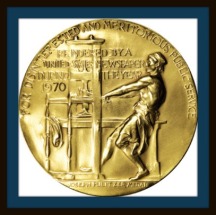
Three Sentence History: Leading journalist of his time, Joseph Pulitzer chose to include a provision in his will establishing the Pulitzer Prizes for achievements in “letters” (fancy way of saying literature), drama, history, and journalism. Each year prizes are awarded to an American novel, an original American play performed in New York, a book on the history of the United States, an American biography, and a history of public service by the press. Given Pulitzer’s flexible will, his advisory board later included a musical composition by an American composer and broader categories for journalistic excellence.
Quick Stats
Who Gives it Out: Colombia University, on behalf of the John Pulitzer endowment
Established: 1917
Genres Considered: There are six literary categories given individual awards – Fiction, Drama, History, Biography or Autobiography, Poetry, and General Non-Fiction
Recent Winner for Fiction: No award was given for 2012 (quite the scandal!)
Some Past Winners for Fiction: A Visit from the Good Squad by Jennifer Egan (2011), The Road by Cormac McCarthy (2007), Middlesex by Jeffrey Eugenides (2003), American Pastoral by Phillip Roth (1998), Beloved by Toni Morrison (1978), A Confederacy of Dunces by John Kennedy Toole (1981), The Killer Angels by Michael Shaara (1975), To Kill a Mockingbird by Harper Lee (1961), Old Man in the Sea by Earnest Hemingway (1953)
For a full list of award winners click here
Man Booker Prize
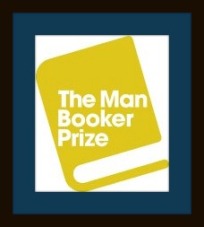 Three Sentence History: Originally sponsored by a company called Booker-McConnell in 1968, the Booker Prize Foundation is now an independently registered charity that awards £50,000 each year to the best novel written in English by a citizen of the Commonwealth or the Republic of Ireland. The Man Booker Prize is considered to be one of the richest, most highly sought after literary honors in the world. The panel of judges that selects the winner each year is made up of authors, publishers, librarians, booksellers, and literary editors among others.
Three Sentence History: Originally sponsored by a company called Booker-McConnell in 1968, the Booker Prize Foundation is now an independently registered charity that awards £50,000 each year to the best novel written in English by a citizen of the Commonwealth or the Republic of Ireland. The Man Booker Prize is considered to be one of the richest, most highly sought after literary honors in the world. The panel of judges that selects the winner each year is made up of authors, publishers, librarians, booksellers, and literary editors among others.
Quick Stats
Who Gives it Out: The Booker Prize Foundation, sponsored by the Man Group
Established: 1969
Genres Considered: All genres are considered
Recent Winner: Bringing up the Bodies by Hilary Mantel (2012)
Some Past Winners: Sense of an Ending by Julian Barnes (2011), Wolf Hall by Hilary Mantel (2009), The Inheritance of Loss by Kiran Desai (2006), Life of Pi by Yann Martel (2002), The Blind Assassin by Margaret Atwood (2000), The God of Small Things by Arundhati Roy (1997), The English Patient by Michael Ondaatje (1992), The Remains of the Day by Kazuo Ishiguro (1989), Midnight’s Children by Salman Rushdie (1981), Rites of Passage by William Golding (1980)
For a full list of past winners, shortlisted selections and judges click here
National Book Award
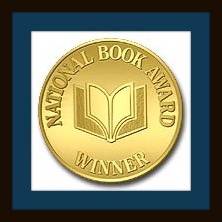 Three Sentence History: Originally established collectively by three large book industry organizations – the American Book Publisher’s Council, the Book Manufacturers Institute and the American Bookseller’s Association – the National Book Award is given out each year to the best American novel. Later the award was expanded to include more than one category with an emphasis placed on giving the award to writers from writers. The National Book Foundation also awards certain authors a medal for distinguished lifetime contributions in literature, some of whom have included Ray Bradbury, David McCullough, Stephen King and Oprah Winfrey.
Three Sentence History: Originally established collectively by three large book industry organizations – the American Book Publisher’s Council, the Book Manufacturers Institute and the American Bookseller’s Association – the National Book Award is given out each year to the best American novel. Later the award was expanded to include more than one category with an emphasis placed on giving the award to writers from writers. The National Book Foundation also awards certain authors a medal for distinguished lifetime contributions in literature, some of whom have included Ray Bradbury, David McCullough, Stephen King and Oprah Winfrey.
Quick Stats
Who Gives it Out: The National Book Foundation
Established: 1950
Genres Considered: Fiction, Non-Fiction, Poetry and Young People’s Literature
Recent Winners: For Fiction – Round House by Louise Erdrich (2012); For Non-Fiction – Behind the Beautiful Forevers by Katherine Boo (2012); For Poetry – Bewilderment by David Ferry (2012); For Young People’s Literature – Goblin Secrets by William Alexander (2012)
Some Past Winners: For Fiction – Let the Great World Spin by Colum McCann (2009), The Corrections by Jonathan Franzen (2001), Cold Mountain by Charles Frazier (1997), All The Pretty Horses by Cormac McCarthy (1992), The Color Purple by Alice Walker (1983), The Invisible Man by Ralph Ellison (1953); For Non-Fiction – The Swerve: How the World Became Modern by Stephan Greenblatt (2011), The Year of Magical Thinking by Joan Didion (2005), The Rise and Fall of the Third Reich by William L. Shirer (1961); For Poetry – A Worshipful Company of Fletchers by James Tate (1995), The Fall of America: Poems of these States; 1965-1971 by Allen Ginsberg (1974), The Collected Poems of Wallace Stevens by Wallace Stevens (1954); For Young People’s Literature – The Absolute True Diary of a Part-Time Indian by Sherman Alexie (2007), The Penderwicks: A Summer Tale of Four Sisters, Two Rabbits, and a Very Interesting Boy by Jeanne Birdsall (2005), Holes by Louis Sachar (1998)
For a full list of past winners and finalists click here
– Well Known Genre-Specific Award Categories –
Newbury Medal
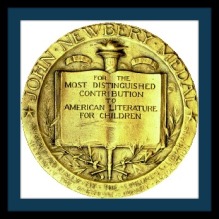 Three Sentence History: The Newbury Medal was established by the American Library Association headed by Frederic G. Melcher who suggested that the award should be named for the famous English bookseller, John Newbury. The board sought to encourage high quality children literature in the United States and demonstrate to the public that children’s books were deserving of praise and recognition, thus making the Newbury Award the first ever children’s book award in the world. To be eligible for the award, the book must be written for a children’s audience and published in English in the United States by an American-born author.
Three Sentence History: The Newbury Medal was established by the American Library Association headed by Frederic G. Melcher who suggested that the award should be named for the famous English bookseller, John Newbury. The board sought to encourage high quality children literature in the United States and demonstrate to the public that children’s books were deserving of praise and recognition, thus making the Newbury Award the first ever children’s book award in the world. To be eligible for the award, the book must be written for a children’s audience and published in English in the United States by an American-born author.
Quick Stats
Who Gives it Out: Association for Library Service to Children (a branch of the American Library Association)
Established: 1922
Genres Considered: Children’s Literature
Recent Winner: The One and Only Ivan by Katherine Applegate (2013)
Some Past Winners: When You Reach Me by Rebecca Stead (2010), The Graveyard Book by Neil Gaiman (2009), Walk Two Moons by Sharon Creech (1995), Number the Stars by Lois Lowry (1990), The Whipping Boy by Sid Fleischman (1987), Bridge to Terabithia by Katherine Paterson (1978), Island of the Blue Dolphins by Scott O’Dell (1961), The Witch of Blackbird Pond by Elizabeth George Speare (1959), Johnny Tremain by Esther Forbes (1944)
For a full list of past winners and honorees click here
Caldecott Metal
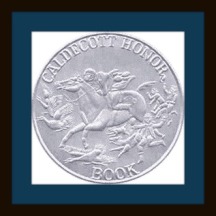 Three Sentence History: Several years after the Newbury Medal was established, there became a growing concern that children’s picture books were not adequately recognized and honored. Thus in 1937, the American Library Association first established the Caldecott Medal in honor of the nineteenth century English illustrator Randolph J. Caldecott. The medal is awarded by the Newbury Medal Committee and given to the artist of the most distinguished American picture book whether or not that artist is the author of the text itself.
Three Sentence History: Several years after the Newbury Medal was established, there became a growing concern that children’s picture books were not adequately recognized and honored. Thus in 1937, the American Library Association first established the Caldecott Medal in honor of the nineteenth century English illustrator Randolph J. Caldecott. The medal is awarded by the Newbury Medal Committee and given to the artist of the most distinguished American picture book whether or not that artist is the author of the text itself.
Quick Stats
Who Gives it Out: Association for Library Service to Children (a branch of the American Library Association)
Established: 1937
Genres Considered: Children’s Literature
Recent Winner: This Is Not My Hat by Jon Klassen (2013)
Some Past Winners: A Sick Day for Amos McGee by Philip Christian Stead (2011), Tuesday by David Wiesner (1992), Lon Po Po: A Red-Riding Hood Story from China by Ed Young (1990), The Polar Express by Chris Van Allsburg (1986), Jumanji by Chris Van Allburg (1982), Where the Wild Things Are by Maurice Sendak (1964), The Little Island by Margaret Wise Brown (1947), Make Way for Ducklings by Robert Mccloskey (1942)
For a full list of past winners and honorees click here
Orange Prize
 Three Sentence History: This is a relatively new award, first established in 1995 in response to a growing awareness that many women authors were being passed over for major literary awards. The Orange Prize for fiction is selected by a panel exclusively of women and is awarded to a female author of any nationality for the best original novel published in the United Kingdom. In addition to the distinction, the winner is awarded £30,000 and a bronze sculpture called Bessie.
Three Sentence History: This is a relatively new award, first established in 1995 in response to a growing awareness that many women authors were being passed over for major literary awards. The Orange Prize for fiction is selected by a panel exclusively of women and is awarded to a female author of any nationality for the best original novel published in the United Kingdom. In addition to the distinction, the winner is awarded £30,000 and a bronze sculpture called Bessie.
Quick Stats
Who Gives it Out: The Women’s Prize for Fiction sponsored previously by Orange telecommunications company and now private benefactors.
Established: 1995
Genres Considered: Fiction written by a woman author
Recent Winner: Song of Achilles by Madeline Miller (2012)
Famous Past Winners: The Tiger’s Wife by Tea Obreht (2011); The Lacuna by Barbara Kingsolver (2010); On Beauty by Zadie Smith (2006); Property: A Novel by Valerie Martin (2003)
For a complete list of winners click here
Printz Award
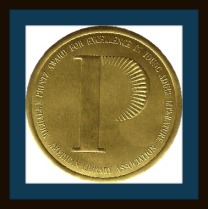 Three Sentence History: Established in 2000, the Printz award was named after Michael L. Printz, a school librarian in Topeka, Kansas who was a long-time active member of the Young Adult Library Services Association. Michael L. Printz dedicated his life working with high schools and librarians to ensure that young adults had access to good literature. The award is given each year recognizing the best book written for a teen audience based entirely on literary merit.
Three Sentence History: Established in 2000, the Printz award was named after Michael L. Printz, a school librarian in Topeka, Kansas who was a long-time active member of the Young Adult Library Services Association. Michael L. Printz dedicated his life working with high schools and librarians to ensure that young adults had access to good literature. The award is given each year recognizing the best book written for a teen audience based entirely on literary merit.
Quick Stats
Who Gives it Out: Young Adult Library Service Association
Established: 2000
Genres Considered: Young Adult Literature
Recent Winner: Ship Breaker by Paolo Bacigalupi (2011)
Some Past Winners: Jellico Road by Melina Marchetta (2009), American Born Chinese by Gene Luen Yang (2oo7), Looking for Alaska by John Green (2006), Postcards from No Man’s Land by Aidan Chambers (2003), Monster by Walter Dean Myers (2000)
For a full list of past winners click here
Hugo Award
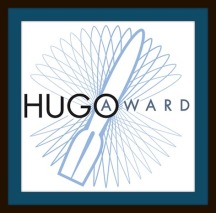 Three Sentence History: Named after Hugo Gernsback, founder of the world famous science fiction magazine Amazing Stories , the Hugo award is given each year at the annual World Science Fiction Convention. The Hugo Award is given out for best science fiction and fantasy writing penned in the past year in some of the following categories: best short story, best novel, best graphic novel, and others. Being the first and longest standing award to recognize science fiction and fantasy writing, the Hugo Award is seen as being one of the most prestigious in the world.
Three Sentence History: Named after Hugo Gernsback, founder of the world famous science fiction magazine Amazing Stories , the Hugo award is given each year at the annual World Science Fiction Convention. The Hugo Award is given out for best science fiction and fantasy writing penned in the past year in some of the following categories: best short story, best novel, best graphic novel, and others. Being the first and longest standing award to recognize science fiction and fantasy writing, the Hugo Award is seen as being one of the most prestigious in the world.
Quick Stats
Who Gives it Out: The World Science Fiction Society
Established: 1953
Genres Considered: Science Fiction and Fantasy
Recent Winner: Among Others by Jo Walton (2012)
Some Past Winners: Blackout by Connie Wilson (2011), The Graveyard Book by Neil Gaiman (2010), Jonathan Stange and Mr. Norrel by Suzanna Clarke (2005), Harry Potter and the Goblet of Fire by J.K. Rowling (2003), Foundation’s Edge by Isaac Asminov (1983), Stranger in a Strange Land by Robert L. Heinlein (1962), The Demolished Man by Alfred Bester (1953)
For a full list of winners click here
To learn more about the equally well-known Nebula Award for science fiction and fantasy click here
Edgar Award
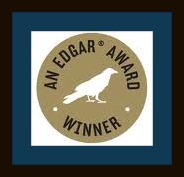 Three Sentence History: The Edgar Allan Poe Awards (of Edgar Awards for short) were first awarded in 1954 through the sponsorship of the Mystery Writers of America. Each year the award is given out to the best mystery and non-fiction mystery novels produced and published in the United States. The Edgar Award is given in twelve different categories, some of which include best novel, best first novel, best fact crime book, best short story, and best young adult among others
Three Sentence History: The Edgar Allan Poe Awards (of Edgar Awards for short) were first awarded in 1954 through the sponsorship of the Mystery Writers of America. Each year the award is given out to the best mystery and non-fiction mystery novels produced and published in the United States. The Edgar Award is given in twelve different categories, some of which include best novel, best first novel, best fact crime book, best short story, and best young adult among others
Quick Stats
Who Gives it Out: Mystery Writers of America
Established: 1954
Genres Considered: Mystery
Recent Winner: Gone by Mo Hayder (2012)
Some Past Winners: Resurrection Men by Ian Rankin (2004), Cimmarron Rose by James Lee Burke (1998), Peregrine by William Bayer (1982), The Laughing Policeman by Maj Sjowall (1971), The Spy Who Came in From the Cold by John Le Carre (1965), The Long Goodbye by Raymond Chandler (1955)
For a full list of past winners click here
——————————————————————————————-
Hope you all enjoyed your jaunt through the wonderful world of literary awards! I realize, of course, that given the hundreds of different literary accolades world-wide this list is but a dent.
For a little “self-study” opportunity click here for a full list of literary awards put together by good ol’ wikipedia. The famed Powells Books also has a wonderful visual guide to all of the awards out there.
As you will discover, the possibilities for various literary “decorations” are endless!
Awards are the given in every field but ones in literature are well known. A list of the most prestigious awards in writing have been listed for you here. The passage is a good read for those who know very little about these awards.
Good listings of awards! I’d probably have included the Nebula along with the Hugo, but that’s just personal preference.